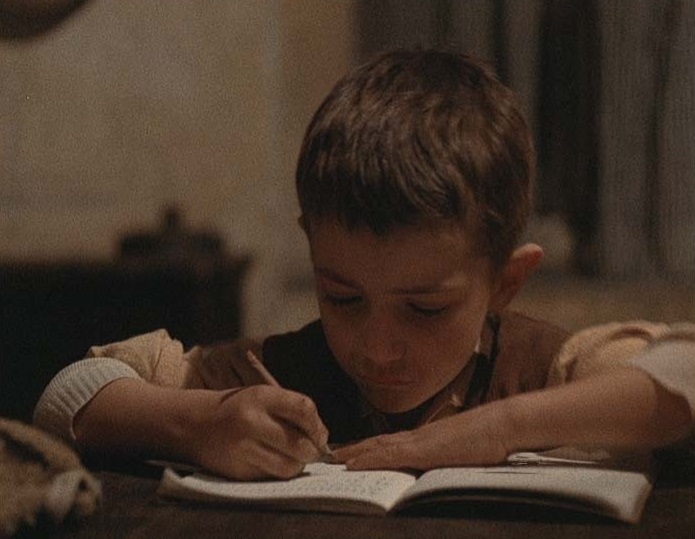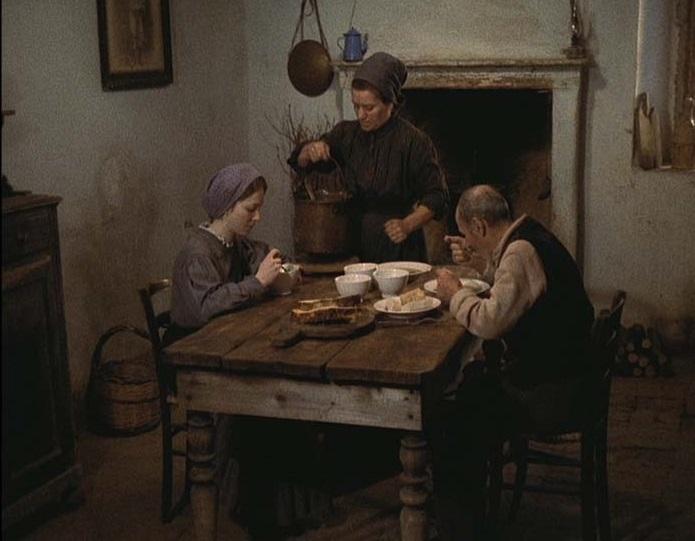Winner of the Palme d’Or at Cannes in 1978, Ermanno Olmi’s The Tree of Wooden Clogs (L’albero deli zoccoli) is a glorious fresco that reveals, over the course of an unhurried three hours and with a pronounced documentary element that virtually eschews narrative development, 19th century Lombardy life in all its hardship and paradoxical beauty. It’s a world defined by labour on the land and Catholicism, in which the details and rituals of existence appear unchanged over centuries.
Yet its opening scene, in which a priest convinces a peasant couple that their young son (pictured below) should go to school, subtly suggests that this old-established world, one in which literacy is barely known and the labour of children as essential than that of adults, is changing. Via an incident alluded to in the film's title, the indirect consequences of that decision return hauntingly in Olmi’s final scene. Nevertheless the director avoids overt social statement: Bertolucci’s 1900, made two years earlier, is its diametric opposite in that respect.
 At the visual heart of the film is the farmhouse-yard, or cascina, in which life is concentrated, home to a number of peasant families (as well, of course, as their animals). The film's introductory titles give brief context to this almost feudal world, one in which peasants eke out their existence as tenant farmers, dependent on the landowners. But while there’s undoubtedly bleakness in The Tree of Wooden Clogs, the final impression the film leaves is very different. Olmi works within the traditions of Italian neo-realism, though the incidental sentimentality of, say, Vittorio de Sica is almost entirely absent here.
At the visual heart of the film is the farmhouse-yard, or cascina, in which life is concentrated, home to a number of peasant families (as well, of course, as their animals). The film's introductory titles give brief context to this almost feudal world, one in which peasants eke out their existence as tenant farmers, dependent on the landowners. But while there’s undoubtedly bleakness in The Tree of Wooden Clogs, the final impression the film leaves is very different. Olmi works within the traditions of Italian neo-realism, though the incidental sentimentality of, say, Vittorio de Sica is almost entirely absent here.
Luchino Visconti’s 1948 La Terra Trema seems the most instructive comparison, but even there it’s the differences that strike more than the similarities. Although both directors worked with non-professional actors, Visconti was an outsider to the world he depicted, while Olmi grew up in an environment not that different from the one he explores in the film. His characters speak in the East Lombard dialect Bergamasque, so different from Italian that its release in Italy was dubbed (this home entertainment release offers both versions).
It’s a film of interconnected story elements rather than any pronounced plot, with scenes that remain gloriously embedded in the memory. They range from the everyday – working in the fields, the slaughter of a pig – to the almost sacred, as in the marriage of a young couple, and their luminously filmed wedding trip to Milan by riverboat. There they encounter both the social context of their times, including the 1898 food riots in the city, and the timeless world of life at the convent-orphanage where they spend their honeymoon: in this juxtaposition of Marxism and Catholicism, Olmi, himself a devout believer, comes down emphatically for the latter.
The 4K restoration here brings out the film’s deep, painterly colours (it's hard not to be reminded of Courbet and the Barbizon School). Olmi was his own cinematographer – and editor, too – shooting on 16 mm for flexibility, and in mono. In a two-minute interview on this Arrow Academy release, he discusses that choice of sound, and reasons for retaining it in the remastered version. Other extras include two brief French television interviews from the 1978 Cannes festival, as well as a longer Italian television cinema programme. The accompanying booklet includes a Sight and Sound 1978 appreciation by Marc Gervais titled “Humanism in the Cinema”, a phrase that completely captures the nature of Olmi’s achievement in this remarkable film.















Add comment